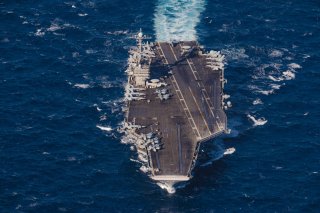Stay Vigilant: NATO Kicks Off Neptune Strike Maritime Exercise
The so-called “vigilance activity” comes during a time of heightened European tensions.
Naval Striking and Support Forces NATO and U.S. Navy’s Sixth Fleet just started Neptune Strike 2022.2, a vigilance activity designed to heighten the NATO alliance’s observation abilities at sea.
“The Neptune series is a tangible demonstration of the power and capability of the NATO Alliance in all domain operations,” said Vice Adm. Thomas Ishee, commander of the Sixth fleet and STRIKFORNATO, in a U.S. Navy statement.
“Neptune Strike 22.2 is a prime example of NATO’s ability to integrate high-end maritime warfare capabilities of an allied carrier strike group, ensuring our collective ability to deter and defend.”
The main contributor to the event is the George H. W. Bush Carrier Strike Group, a nuclear-powered U.S. Navy aircraft carrier, and its support group vessels. This latest iteration of Neptune Strike builds on previous vigilance exercises.
“Vigilance Activities are a base line, or normal day-to-day activities, occurring in all domains, and across SACEUR’s area of responsibility to ensure appropriate strategic awareness and force readiness required to sustain peace,” the U.S. Navy statement explained.
“The Neptune Series of peacetime vigilance activities, integrating carrier strike and amphibious strike capability into NATO operations, has become routine work for this battle staff—generating effects in the maritime, air and land domains, providing deterrence and reassurance, and offering powerful opportunities for Allied interoperability,” said Royal Navy Rear Adm. James Morley, STRIKFORNATO’s deputy commander.
“I am excited to watch this outstanding team of professionals come together again and prove the power and cohesion of our NATO Alliance.”
The exercises come at a time of heightened tensions in Europe. With the flames of war still burning in Ukraine and Russian forces seemingly on the defensive across broad swaths of Ukraine, America’s European allies are understandably nervous.
Russia’s invasion has caused such significant continental concern that Finland and Sweden—both historically neutral countries—petitioned NATO to join the alliance in a stark reversal of nearly eighty years of both countries’ foreign policies.
The U.S. Navy statement explained that this latest iteration of Neptune Strike is designed to improve interoperability between U.S. carrier strike groups, NATO naval forces, and the Supreme Headquarters Allied Powers Europe.
Any exercises with NATO, especially U.S. forces, are seen as particularly valuable in Europe these days.
“The GHWBCSG has worked closely with our counterparts at STRIKFORNATO and within the NATO Alliance since our pre-deployment training events,” said Rear Adm. Dennis Velez, commander of the George H. W. Bush Carrier Strike Group.
“We look forward to continuing to strengthen our relationships while also training with our Allies. The teamwork, trust, and combat readiness built through these events are our competitive advantage.”
Caleb Larson is a multimedia journalist and defense writer with the National Interest. A graduate of UCLA, he also holds a Master of Public Policy and lives in Berlin. He covers the intersection of conflict, security, and technology, focusing on American foreign policy, European security, and German society for both print and radio. Follow him on Twitter @calebmlarson
Image: DVIDS.

